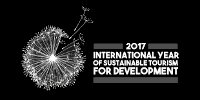Earth Changers’ Footprint
Having spent decades witnessing the negative impacts tourism creates, Earth Changers was created to promote positive impact, regenerative tourism, to encourage the sector and its consumers to make more sustainable choices to create a net positive contribution in destinations.
We discern and curate our partner suppliers based on high-integrity sustainability; they are already involved in extensive climate initiatives which we communicate.
As far as we know, we were the first commercial travel organisation to write about the intersection of tourism and all the sustainable development goals, in 2016, transparently explaining world problems to which tourism can add – or proactively choose to help solve.
For all of these reasons, Climate Action, SDG 13, is an area which we’ve always advocated significantly. We were a launch day signatory for Tourism Declares a Climate Emergency in 2020, and to its subsequent COP26 UN-supported Glasgow Declaration in 2021, because we care about climate change and so action. We understand that the work and sector is so enormous globally it needs to come together for impact.
Along with us, our partners in these destinations have also signed the climate action Glasgow Declaration:
Our Climate Declaration
We have a responsibility to create and publish a climate plan to measure, reduce, report and advocate a global commitment to reduce tourism emissions by half by 2030, and reach Net Zero as soon as possible before 2050. We commit to align with five shared pathways:
Measure: and disclose all travel and tourism-related emissions. Ensure our methodologies and tools are aligned to UNFCCC-relevant guidelines on measurement, reporting and verification, and that they are transparent and accessible.
Decarbonise: Set and deliver targets aligned with climate science to accelerate tourism’s decarbonisation. This includes transport, infrastructure, accommodation, activities, food & drink, and waste management. While offsetting may have a subsidiary role, it must be complementary to real reductions.
Regenerate: Restore and protect ecosystems, supporting nature’s ability to draw down carbon, as well as safeguarding biodiversity, food security, and water supply. As much of tourism is based in regions most immediately vulnerable to the impacts of climate change, ensure the sector can support affected and at-risk communities in resilience building, adaptation and disaster response. Help visitors and host communities experience better balance with nature.
Collaborate: Share evidence of risks and solutions with all stakeholders and our guests, and work together to ensure our plans are as effective and co-ordinated as possible. Strengthen governance and capacity for action at all levels, including national and sub-national authorities, civil society, large companies and SMEs, vulnerable groups, local communities and visitors.
Finance: Ensure organisational resources and capacity are sufficient to meet objectives set out in climate plans, including the financing of training, research and implementation of effective fiscal and policy tools where appropriate to accelerate transition.
As a boot-strapped sustainable tourism start-up, this is a huge resource task for us, especially with a global pandemic bringing the sector to its knees for 2-3 years.
This also means we’re starting from the lowest point: from start-up our emissions will of course only rise – but by measuring and monitoring as we grow, we’ll keep in check, plus provide trips for consumers whose alternatives would likely otherwise create higher emissions.
We keep a holistic balance with the positive impacts that our trips create, which are not all quantifiable in carbon terms: our partners’ positive impacts including conservation and community development, culture, water and sanitation, health, education and livelihoods are documented transparently on each Place we feature.
Below we present our climate carbon plan and footsteps, which we will dynamically evolve and build on.
Climate Action: What We’ve Done
Collaborate: Jan 2018 - Joined SunX Council for Climate-Friendly Travel
Collaborate: Jan 2020 - Launch day signatory, Tourism Declares Climate Emergency
(now grown into The Glasgow Declaration as a programme of The Future of Tourism Coalition)Collaborate: August 2020 - Joined The Future of Tourism Coalition.
Collaborate: 2021 - Signed The Glasgow Declaration & crreated new web content section
Measure: May 2022 - Methodology - annual Scope 1,2 emissions report aligned with accounts; monthly averages can be extracted.
Measure: August 2022- Scope 1,2 details recorded:
Energy (green: gas, electricity), water, transport, cloud hosting (website, email & documents).
Reported & established baseline (not ideal as a startup during Covid: no ‘usual’ operations).
Measure: 2022 - Created & publish initial plan.
Measure/Decarbonise: June 2023 - Travelife Partner certification submission with updated and prioritised plan.
Created a Sustainability Policy
Created a Sustainable Purchasing Policy (SDG12, sustainable consumption)
Updated supplier contractual with additional sustainability criteria (energy, water, waste, carbon, plastics).
Collaborate: Contributed to Evening Standard article ‘15 Ways to be a Climate-Friendly Traveller’.
Measure: 2023 - Annual accountancy change (financial + aligned emissions) from year end August to November.
Climate Action: In Progress
Regenerate: Earth Changers promotes positive impact, regenerative tourism daily, it’s what we’re all about.
Collaboration: Campaigning & advocacy via social media, email marketing and PR.
Decarbonise: Ongoing - email/file clearance to minimise cloud hosting carbon emissions; energy & water use reduction.
Climate Action: In Future
Measure/Decarbonise: 10% per year - Travelife reporting - on Scope 2 resource efficiency, to reduce >50% by 2030:
Office - energy (100% LED lights), water, equipment, waste, paper consumption, cleaning products, plastic, supplies
Personal - clothing, water bottles/cups/lunchboxes, food (waste), packaging
Promote lower carbon transport via reorganisation of relevant content
Finance: Seek funding for business development. Dependencies include:
Decarbonise: Replatform to reduce cloud hosting
Measure: Scope 3 accounting for client trips - gather suppliers’ carbon/impact data (local transport, accommodation, activities, guides, staff, offices, food, waste)
Measure: Publish Supplier data
Measure: Further homeworker impacts
Regenerate: Consider ‘offset’ options for residual emissions
Collaborate: Join Global Plastics initiative
Collaborate: Verification & assurance
Climate Action: Reports
Definitions:
Carbon Footprint: Measures the greenhouse gas emissions (“GHGs”: carbon dioxide, methane, and nitrous oxide) from all the activities across the organisation, including energy used in buildings, processes, business travel, consumption of goods and services and waste disposal, etc. This is usually stated as CO2e, or carbon dioxide equivalent, to allow easy comparison across organisations, products, industries, and countries.
The GHG Protocol defines three ‘scopes’ of emissions, correlating to who ‘owns’ those emissions and the level of control applicable to changing those emission levels at each stage:
Scope 1: All direct GHG emissions from the activities of an organisation or under their ownership and control. Including fuel combustion on site such as gas boilers and fleet vehicles. Eg. energy for heat from gas boiler for home working.
Scope 2: Indirect GHG emissions from consumption of purchased electricity, heat, steam or cooling. Eg. electricity for office/home working.
Scope 3: All other indirect emissions (not included in Scope 2), that occur in the value chain of the company, upstream and downstream, such as the extraction, production and provision of purchased materials and fuels, transport in vehicles not owned or controlled by the company, outsourced activities. Eg. customer travel to/from destination; transport in destination; accommodation; food; waste and disposal; contingency for supply chain emissions and commodity purchases.
Scope 1 and 2 emissions are often a mandatory part of reporting, Scope 3 tends to be voluntary, although may be the largest emissions.
Measurements
We provide exact measurements where available, or estimations and methodology where not.
Conversion Factors: As a UK-based business, we use DECC/Defra’s Greenhouse Gas Conversion Factors / The Carbon Trust carbon calculator tool using the same. We’ve also referenced HMRC Environmental Reporting Guidelines and Hotelfootprints.org.
Boundaries: We’ve reported that which we have financial or operational control over.
Our measurements align with our legally required financial reporting and financial year.
















